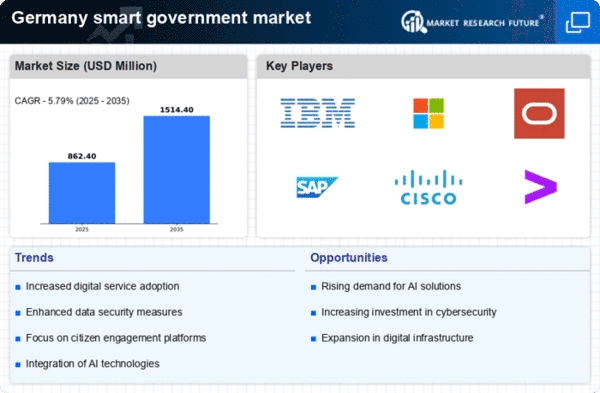Citizen Engagement and Participation
In Germany, the emphasis on citizen engagement is reshaping the smart government market. Initiatives aimed at increasing public participation in decision-making processes are gaining traction. The government has launched various digital platforms that allow citizens to voice their opinions and contribute to policy formulation. This trend is reflected in a recent survey indicating that 70% of citizens prefer digital channels for interacting with government services. By fostering transparency and accountability, these initiatives are likely to enhance trust in public institutions. Consequently, the smart government market is expected to expand as more resources are allocated to develop user-friendly platforms that facilitate citizen engagement.
Focus on Data-Driven Decision Making
Data-driven decision making is becoming increasingly vital in the smart government market in Germany. The government is leveraging data analytics to improve service delivery and resource allocation. By utilizing data from various sources, including public feedback and operational metrics, authorities can make informed decisions that enhance public services. This approach is supported by a recent report indicating that 65% of government agencies are investing in data analytics tools. As the demand for data-driven solutions rises, the smart government market is likely to witness a growth rate of 12% annually, reflecting the importance of data in shaping effective governance.
Regulatory Frameworks and Compliance
The establishment of robust regulatory frameworks is a critical driver for the smart government market in Germany. The government is actively working to create policies that support the adoption of smart technologies while ensuring data privacy and security. Recent legislation, such as the Digital Services Act, aims to regulate digital platforms and protect citizens' rights. This regulatory environment encourages investment in smart solutions, as companies seek to comply with stringent standards. As a result, the smart government market is anticipated to grow, with an estimated increase of 20% in investments in compliance-related technologies over the next few years.
Investment in Cybersecurity Solutions
As the smart government market in Germany expands, the need for robust cybersecurity solutions becomes increasingly apparent. With the integration of digital technologies in public services, the risk of cyber threats escalates. The German government has recognized this challenge and is investing heavily in cybersecurity measures, with an estimated budget of €500 million allocated for enhancing digital security across government platforms. This investment aims to protect sensitive citizen data and maintain public trust in digital services. Consequently, the smart government market is expected to see a significant uptick in demand for cybersecurity solutions, potentially increasing by 5.79% over the next few years..
Technological Advancements in Infrastructure
The smart government market in Germany is experiencing a surge due to rapid technological advancements in infrastructure. Innovations such as IoT, AI, and big data analytics are being integrated into public services, enhancing efficiency and responsiveness. For instance, the German government has allocated approximately €1 billion for smart city projects aimed at improving urban mobility and public safety. This investment is expected to create a more interconnected environment, facilitating real-time data sharing among various government agencies. As a result, the smart government market is projected to grow at a CAGR of 5.79% over the next five years., driven by the need for modernized infrastructure that supports digital services.
















